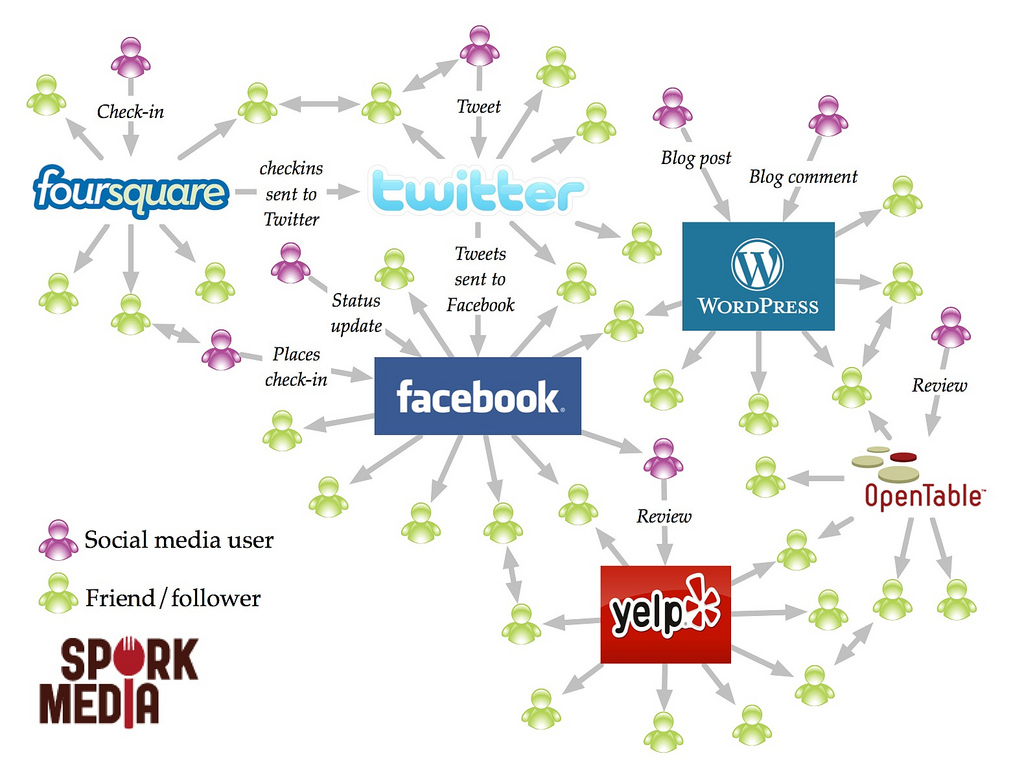10 Social Media and Marketing Gurus that Your Law Firm Should Follow on Twitter
10 Social Media and Marketing Gurus that Your Law Firm Should Follow on Twitter
Featured image courtesy of Rosaura Ochoa licensed under creative commons.
If your law firm is on Twitter, and it should be, there are many useful feeds to follow. We are interested in the ones that will help your law firm market itself. To that end, we have compiled a list of useful Twitter accounts focused on marketing and social media. We have mentioned some of these earlier in an article about legal Twitter feeds, but we feel that anything repeated was worth repeating. Although very few of us went into law school thinking of law as a business, it is. These Twitter feeds help us out with some of the stuff we missed when we were taking pre-law liberal arts classes.
- Kevin O’Keefe – Kevin always provides useful articles and observations about the intersection of social media and law. His tweets are often also about technology in general. We find ourselves wanting to re-tweet him a few times a day. If you plan on using social media as part of your law firm’s marketing plan, following Kevin is a great way to start.
- Jeff Bullas – When it comes to creating content about using social media for business, Jeff Bullas may be king. Although his feed contains little legal content, it is essential if you are trying to get a leg up in the world of social media. Jeff Bullas is the very definition of a guru.
- Lilach Bullock – She specializes in internet marketing and posts useful articles. More importantly, she is really nice and has written us a personalized comment every time we have re-tweeted her.
- TweetSmarter – Twitter may be an absolutely horrifying platform, especially for new users, but the conversation happening there is essential to the future of legal practice. TweetSmarter posts tips that make Twitter a litte less scary.
- Buffer – Nothing does a better job of making Twitter manageable for us than Buffer. Buffer allows you to plan out your tweets for the day so that you aren’t faced with the choice of posting many things at once or remembering to go on Twitter multiple times each day to space out your posts. Buffer also integrates with most browsers so that you can simply add tweets to your queue. We promise the app is worth playing around with. Their Twitter feed is useful as well.
- Marieke Hensel – Lots of great posts here. She also re-posts lots of useful information from other Twitter users.
- John Lichtenberger – He helps attorneys advertise and understands both legal advertising and the laws of advertising.
- SEO web pro – This company posts lots of great articles about optimizing your website to get great search engine results as well as other useful articles about marketing. Their links take you to a landing page, but generally you will find that the articles were worth the extra click to get to.
- HubSpot Platform – HubSpot is a company that specializes in inbound marketing software. They do a great job of posting useful information about technology for small businesses. Their posts are often related to social media, but cover a larger and more interesting range than that. HubSpot is definitely worth a follow.
- DotCO Law Marketing – If you somehow are not already following us, we invite you to start. We wouldn’t actually call ourselves gurus, but you are welcome to. We try to provide a mix of useful original content, like this blog post, as well as an aggregation of great content from other Twitter users and websites. Our focus is always on lawyers at small to medium sized law firms and providing information that makes their lives easier.
Which Social Media Networks are Right for Your Law Firm?
Featured image courtesy of kat m research licensed under creative commons.
Which Social Networks Should My Law Firm Join?
Social Networking seems to be growing exponentially. Nearly every week, we get an invitation for a new network. At first it was just LinkedIn, Facebook, and Twitter. Google+, Pinterest, and many others have since sprouted up. How do you know if your firm needs a YouTube page? Should you be on Flickr? In this post we will do our best to help you decide which networks are right for your law firm.
First, we need to establish that your firm should be using social media at all. Is there really a reason to invest so much time and effort into something that does not provide clear results? Yes. Here are three of the most important reasons why:
- If someone is using social media to find a lawyer, your firm has to be there or else it won’t be found.
- If all of your competitors and colleagues are using social media, but you aren’t, your firm may appear less cutting edge and up to date.
- Social media, when used correctly, is a conversation. It is a way to make connections and learn.
Once you have decided to establish social media accounts for your firm, you must decide which networks make the most sense for you. First, I will deal with the no-brainers.
Networks Your Firm Must Join
When you first log on to Twitter, it appears to be a jumbled chaotic mess full of spammers and self-proclaimed experts. However, after a little exploring, it becomes apparent that Twitter is the largest conversation that has ever existed. Part of that conversation is about the practice of law, and, as it has often been said, that conversation will happen whether you participate or not. The decision to not only use Twitter, but to participate in that conversation, drives learning, networking, and the practice of law. Twitter is also the place many people go to complain (or rave) about businesses and services. Monitoring Twitter regularly allows you to see what people are saying about you. We have previously published a post that can help you figure out who to follow on Twitter if you are just getting started. (Follow DotCO Law Marketing on Twitter)
LinkedIn is a place for professionals to meet. It is a bit like Facebook, but more business oriented. Every lawyer should be on LinkedIn individually and every firm should also have a page. LinkedIn helps lawyers cultivate and maintain professional relationships made offline while allowing for introductions and networking online. Built-in groups features help you plan events and have discussions. Job search features can help you find new employees. (Find us on LinkedIn)
By now, you probably know what Facebook is and how it works. The important question is whether your firm belongs there. It does. Believe it or not, there are people who will look for a lawyer on Facebook. Just being there might get you a client at some point. Law firms should not expect to get the same reaction from their pages that major corporations get. There is no reason why your law firm should ever have thousands or “likes” or fans. Facebook does allow you to easily share links, contact information, and other relevant news without keeping a window open all day. Your firm’s Facebook page will not need constant monitoring, as almost no one will visit it. If you are investing time on social media, it is worth a few hours to create a Facebook page, but do not let it drain your time or resources after that. (Visit DotCO Law Marketing on Facebook)
Networks to Join for a Specific Purpose
Google+
Google+ seems to have stalled a bit since its inception. No one is quite sure what to use it for right now. Its main advantage over Facebook in its infancy was better privacy controls. However, Facebook has since adopted similar mechanisms. The biggest reason to be on Google+ is that it gives your firm the appearance of being tech-savvy. People do not accidentally find themselves on Google+, and anyone finding your firm’s page there will realize this. A firm with a Google+ page gives the appearance of staying current in technology, which may also help you convince potential clients that you are on the forefront of legal practice. Google+ does not seem the be the place where the future of legal discourse will evolve, but is probably the best social network for people interested in the advancement of technology.
YouTube
If your firm has a good reason to be on YouTube, you probably already have an account. Posting videos about commonly asked legal questions is a great way to get attention while helping potential clients. Your firm might also make videos introducing all of its employees, partners, and associates, or give a tour of your office. YouTube’s utility is somewhat limited, but a great video can be seen by thousands of people.
Networks Your Firm Can Safely Ignore
Flickr
There is almost no reason why your firm would need a Flickr account. While we have previously discussed the importance of keeping a good camera around, it doesn’t make too much sense for a law firm to keep many pictures online. A gallery on your website or Facebook showing off your employees and office is fine, but you should not expect to accomplish any useful legal networking on a site like Flickr.
Spotify
While Spotify has been rapidly growing as a network for music fans, it offers no real benefit to law firms. That being said, it doesn’t hurt to grab a personal account and see what your friends are listening to.
Myspace
To paraphrase Disney’s Lion King:
Mufasa: Everything the light touches will be yours
Simba: What about that shadowy place?
Mufasa: That is Myspace. Lawyers must never go there, Simba.
Too Early to Know
It seems that every day, we come across multiple articles on Pinterest. Some of them are even about how lawyers can use this service. It doesn’t hurt to make a page for your firm, just to hold the name. It could turn out that Pinterest gets huge, and that lawyers flock to it, but we wouldn’t suggest spending too much time on it right now.
Does Your Law Firm Use Other Social Networks?
Have we missed any important social networks that your firm uses? Please comment and tell us what other networks make sense for your firm.
Read MoreLegal Marketing Strategies – Switch From Absolut to GEICO
Legal Marketing Strategies – Going from Absolut to GEICO by Diversifying
Featured image courtesy of teamstickergiant licensed under creative commons.
This blog has previously covered many different types of advertising strategies for law firms. We have recommended everything from billboards and newsletters to websites, radio ads, phone books and legal directories. A core principle at DotCO Law Marketing is the belief that using multiple types of advertising simultaneously is the most crucial part of your marketing campaign. This is why we recommend that the advertising space that we sell is used to supplement other advertising strategies such as firm websites and legal directory listings.
The GEICO Model vs. The Absolut Model
For a long time, Absolut Vodka had an excellent advertising campaign. Their iconic ads by TBWA were simple, clever, and pervasive. They became part of pop culture and stayed there for years. For many people, the Absolut bottle was the first image that popped into their head when they thought of vodka. While those advertisements were top notch, they were mostly limited to print, especially magazines. As the internet became more widely used, and social media grew in popularity, Absolut did not adapt. While the brand still enjoys strong sales, today’s market would rather drink Grey Goose because it comes in a better looking bottle.
As Absolut’s marketing campaign was fizzling out, GEICO came out of nowhere, seemingly made of pure magic. Rather than having one solid line of commercials, they had many, often at the same time. GEICO commercials saturated print, billboards, television, radio, the internet, and, briefly, were the basis of a television series. On any one day, a consumer might hear a standard sounding radio commercial about 15 minutes saving them 15% on car insurance, walk past a billboard featuring a pile of money with eyes staring back, see a print ad involving a gecko, watch a television spot involving a caveman, and download a GEICO ringtone. GEICO has done an incredible job of making multiple campaigns and characters more recognizable than even a single campaign from some other insurance companies. Their advertising has paid off, and GEICO is now one of the largest insurers in the United States.
Applying This Lesson to Your Law Firm
Very few law firms are ever going to have multiple television campaigns running at once, and even fewer will ever have apps or ringtones, but there is still plenty to be learned from what GEICO has done. No one type of advertisement will be seen by every potential customer. Furthermore, different types of advertising work on different people. When your law firm is planning advertising strategies, as many methods of advertising as possible should be used. Whether you decide to use one binding theme in all of your ads or to mix things up with a combination of serious and humorous ads, the key is to put them in more than one place. Billboards are great. So are television and radio. Advertising on the internet is essential. However, in this age, it must be remembered that the internet is not just one thing. A great website is essential, but it must be supplemented. Whether you pay a search engine for advertising space, list your firm with a directory, advertise with DotCO, or all three, saturation is key. When someone searches for a lawyer online, they can only choose your firm if they see it. The more searches that return your firm’s name, the more potential clients you will have. If your name is everywhere, it will be seen eventually.
Read MoreManaging Your Law Firm’s Online Reputation
Online Reputation Management for Your Law Firm
Frequently, a potential client’s first introduction to your firm is online. The client may see your firm’s website, a legal directory listing, or even a blog post written by an associate. These are generally good things. Unfortunately, if you have disgruntled former clients, potential new clients are likely to come across negative reviews on Yelp, disparaging Facebook posts, or a poor review on Google Places. It is essential that you prevent bad reviews from happening in the first place, and quickly take steps to counteract them if they pop up anyway.
The Key to a Good Online Reputation Starts Offline
The best way to get new clients is word of mouth. Personal referrals lead to law firm growth in a way that usually cannot be matched through advertising. At the same time, a law firm’s reputation is most vulnerable to attacks by its own clients. The best thing you can do to manage your firm’s online reputation is the same thing you already do to manage your professional reputation: Be professional! Treating clients with respect, giving them frequent updates about their case, and staying in touch and open to their concerns can only help you both in your practice and from a business standpoint. Of course, even the best attorney will find themselves at the receiving end of undue anger from a client who should really be upset with their own actions or the law.
The Most Important Places to Monitor Your Reputation
- If your firm has a Facebook page, monitor it. Make sure that any negative comments or posts are dealt with quickly. Simply deleting them can work, but it can also cause a major uproar. Addressing the concerns voiced in a malicious or unflattering post is the best way to fix the problem. Communicate as openly as possible to show other potential clients that you are responsive and have nothing to hide.
- Many unhappy customers take their complaints to Twitter. Searching Twitter daily for your name and your law firm’s name can help you ward off negative attention before it picks up steam.
- Perhaps the worst two places to fight negative reviews are Google Places and Yelp. Both of these services allow for detailed reviews of your firm. Google Places search results appear on nearly every relevant search, while Yelp results are often ranked very high in searches. One or two poor reviews on these services can do incredible amounts of damage to your reputation. It is essential that you not respond negatively to these types of reviews, as this will intensify the situation. If you are having a problem with either of these sites, it is essential that you contact an Online Reputation Management professional.
How to Deal with an Unfair or Negative Review
There are both online and offline solutions to this problem:
Offline Solutions
If a client has posted a negative review, your best bet is to address their concerns. Contacting them directly in an attempt to rectify the problem is generally a good idea. It is essential that you do not accuse or argue with them. Do what you can to persuade them to remove or correct their own review. Threatening your own clients, especially with legal action, will generally only make the problem worse. Even if you believe that the review or comment is defamatory in nature, escalating the dispute will be seen by the public as you attacking your own customers.
Online Self Solutions
Many websites have built in mechanisms for disputing or removing false information. Try to ask a website (politely, and without threatening!) to take down the false information. Encourage other customers to write positive reviews which contrast the problematic post.
Reputation Management Companies
When all else fails, or you feel that you are in over your head, your best bet is to contact a Reputation Management Company. If you are a larger firm, this should probably be the first thing you do. While the services provided can be costly, your reputation is your most valuable asset, and is worth defending. These companies can often work to change search results in a way that hides the problem from simple searches by potential customers.
Other Ideas?
Reputation management is a quickly developing field responding to an ever-evolving problem. Have you found any other useful tools for monitoring or managing your reputation? Have you figured out any strategies for dealing with a rogue client? Does your firm’s social media policy address these situations? Do you have a plan in place for how to quickly and decisively deal with online reputation problems as soon as they pop up? Feel free to discuss these issues in the comments below!
Featured image courtesy of Ethan Hein licensed under creative commons.
Read More7 Twitter Users Your Law Firm Needs to be Following Now
7 Twitter Users that Lawyers at Small and Medium Sized Firms Should be Following:
If you are on Twitter, you know that finding the best sources of information can be difficult. Some firms use Twitter purely for advertising. Others aggregate content from many sources. Most importantly, some users create content that will help your firm. These 7 users are sure to provide you with useful information.
- Kevin O’Keefe – Kevin always provides useful articles and observations about the intersection of social media and law. His tweets are often also about technology in general. We find ourselves wanting to re-tweet him a few times a day.
- Michael Kessler – A combination of quirky cases from around the country and new legal developments keep this feed both entertaining and useful.
- Jeff Bullas – When it comes to creating content about using social media for business, Jeff Bullas may be king. Although his feed contains little legal content, it is essential if you are trying to get a leg up in the world of social media.
- JDSupra Legal News – This feed covers a broad range of topics that lawyers are interested in. A good mix of legal news and advice on legal topics.
- Law Technology News – This aptly titled feed covers both technology relevant to lawyers and law relevant to technology.
- Law News – This is another legal news source. A wide range of topics are covered, but most concern either legal developments or news about law firms.
- DotCO Law Marketing – Of course we think you should follow us. We do our best to provide original content and generally post two new blog articles each week. We spend the rest of our time on Twitter aggregating the news we think is the most relevant for small and medium sized law firms who are trying to create a presence on the internet and in social media.
Leave us a comment if you think we forgot any important sources of news for lawyers. We would love to follow you on Twitter too.
A Good Web Site is Not Enough
The Disconnect Between How We Use the Internet and How We Advertise on it
Nearly every law firm needs a good website. This has been true for years and will remain true for the foreseeable future. Whether your firm is a large, international, legal powerhouse, or something you run in your spare time out of your house, a good website is essential. A modern and well maintained website projects an air of professionalism. Many of today’s clients will judge you by how your site looks and behaves. However, no matter how much work you put into a site, no matter who builds it, and no matter how much it cost you, it is useless if potential clients do not see it.
It is useful to think of a website like an office lobby. Once inside, it should be modern and convenient while projecting your law firm’s personality. The most important part of the lobby, however, is getting clients to walk in the door. A website works in the same way.
How Lawyers Advertise
Lawyers have traditionally just built a website and hoped for the best. Some lawyers also optimized their sites to increase search engine results. The internet is unfathomably large. Building a website and just leaving it there is not enough. Traffic needs to be driven to your site. You also need to interact with potential clients and others in the legal community outside the confines of your own website.
How Clients Use the Internet
Clients are rarely looking for your specific website. Think about your own use of the internet. You are generally looking for an answer, a product, or a service. You often want a quick and easy solution. Clients are the same way. They are not trying to look though pages of search results or legal directories. Clients will generally click on one of the first things they see that seems to answer their question. On the internet, Ricky Bobby’s mantra stands true. “If you’re not first, you’re last.” Being on the third page of Google search results is almost useless. When is the last time you skipped the first 25 links that seemed to answer your question?
There are many traditional tactics for getting potential clients to visit a website:
- Search Engine Optimization (SEO) – Building your site in such a way that it shows up well in search engine results. The hardest, and most productive, thing you can do for your website is to have it show up in the first page of Google search results. Competition can be extreme, but the results are often worth the effort.
- Legal Directories – By joining legal directories and paying high fees, you can have your name and a link to your website show up on a legal directory. In this case, your site may get increased traffic, but it is directly competing against many other sites.
- Paid Ad Placement – Search engines like Google allow you to pay to have your firm’s site show up in search results. This can be a great tactic, but can get expensive quickly. It also requires you to figure out what your clients will be searching for.
- Traditional Advertising – Anything from billboards to radio commercials can drive internet traffic your way. Unfortunately, this type of advertising is unlikely to reach a focused group of potential clients.
- Smartphone apps – Creating an app for your firm could be useful if you run a large firm. It could help you provide information to clients and even attract new clients. However, it can be very costly to create a functional and clean looking app. The market is segmented. How do you decide whether to make an app for Android, iOS, or Blackberry? All three are important. Perhaps the largest problem is that it potential clients are unlikely to find and download your app. Legal ethics rules also can be a challenge in this arena.
- Relying on a Facebook page as if it were a website – A Facebook page is a useful communication tool, but it is most likely to be seen by people you already know. It is a great way to stay in contact, but should not be used as a primary method of finding clients. Relying solely on Facebook for a web presence is also a mistake because you don’t own the property you are investing in, Facebook does and they can change the rules of the game at any time.
- Social Networking – Having an active account on Facebook, Twitter, Google+, and LinkedIn puts your name in more places. It gives you more opportunities to drive traffic to your site. Social networking also allows you to have informal discussions with both peers and potential clients.
- Blogging – By hosting your own blog or by guest-posting on more established blogs, you can drive traffic to your site. Writing about interesting topics means that more people are likely to see your name and visit your website.
- Advertising with a localized service – Companies like DotCO Law Marketing place advertisements on content rich sites with localized legal and geographic information. When you advertise with such a company, often at an extremely low cost, you can expand your web presence, boost your Google search results, and drive traffic to your website.












